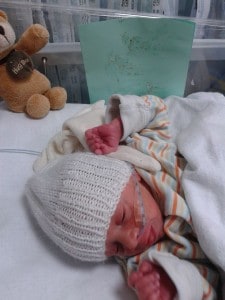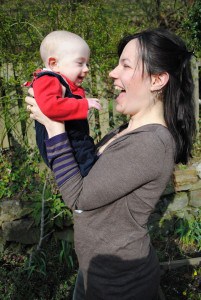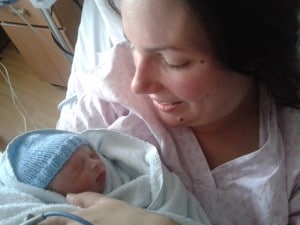Rebecca’s second son was born early, and spent several weeks in Special Care. Here she writes of that difficult early time, and of learning to balance her fragile newborn’s needs with those of her older child.
Throughout my first pregnancy I felt like some sort of earth goddess woman – strong and beautiful, powerful and confident in my body. I felt powerfully attached to the tiny being inside me from a very early stage, and he was born at home, without complications.
When I became pregnant again, I looked forward to repeating the experience. I found it much harder this time, though. I was working almost full time, commuting longer distances, and mothering a two year old (who was adjusting to having daddy at home and mummy out at work). I was exhausted and full of fears – what if I wasn’t up to having two children? How could I possibly ever love another child as much as I love my firstborn? If I love him so much, how can he wind me up so much? What if I can’t cope at home again? What if our finances meant I had to go back to work early?
My body was struggling too. My knees and hips felt a million years old. Trudging up the hill to our house at the end of each work day I felt I was almost going so slowly that I was in reverse. I had terribly swollen feet and had to get special permission to wear sandals at work as they were the only shoes that would fit. At about 32 weeks pregnant I started to get a pain in my chest which I assumed must be heartburn (well, I knew it wasn’t a heart attack and everyone knows pregnant women get heartburn, right?).
Unfortunately, I didn’t realise that pre-eclampsia can occasionally also come with a pain called epigastric pain. It’s an intermittent pain, so appeared to respond to heartburn medication I started throwing back. Ten days after this began I felt so rough I finally asked a nurse at the health centre I work in to check my blood pressure. Very soon after I was on my way to hospital with an overnight bag.
As soon as I arrived at the hospital it was clear I did have pre-eclampsia, and the midwives and doctors immediately started working to stabilise me as an anaesthetist gave me all the information I would need to consent to a caesarean section. The plan was to keep me pregnant long enough to give me two doses of steroids twelve hours apart to mature the baby’s lungs, but to be ready to operate earlier if it became necessary.
After a night of very little sleep and lots of monitoring, I got the news that I was stable enough to attempt induction instead of going straight to a c-section. I wasn’t as delighted as I expected to be.
Fortunately, nature kicked in and labour went quickly. My room had big windows and I was able to look out at a beautiful panorama of sky and hills. In between contractions and in a haze of hormones (natural and synthetic), exhaustion and gas and air, I attempted to explain to my husband that I was one with the hills, in giving birth I was part of them and every woman and animal mother that had ever roamed them. Sensibly, he did not press me for details.
Twenty four hours after arriving in hospital expecting it all to be a false alarm I had delivered a 4lb baby boy at 33+2 gestation. The first I saw of him was a tiny hand sticking in the air and at that moment the love for him hit me like a wave – he was mine and he was perfectly so. Within seconds he was away from me, on a Resuscitaire being assessed and stabilised. After a few minutes he was brought to me for a brief cuddle and then he was gone, off to the Special Care Baby Unit, and I was stranded on Labour and Delivery, still unwell and unable to walk or visit him until the next morning.
Thankfully, even though he was so little, Fergal seems to have escaped with no long term harm from his early start. He spent three weeks in SCBU. The earliest days were hardest. The staff felt strongly that babies needed to be in their incubator as much as possible to allow them to rest, but I felt that the best place for him was on my chest. He was too weak and sleepy to be able to gain much of his nutrition from direct breastfeeding and had expressed milk via a naso-gastric tube. Also the staff felt that I should not put him to the breast at every feed as the effort to nurse would tire him out. But I felt that the benefit of being at the breast would more than outweigh the calories he expended there.
I was still quite ill myself and had to trek back and forth between my ward and SCBU as well as keep up with expressing regularly. With lots of support from my LLL family I was able to gently increase the amount of time he spent in my arms and feel confident that I was doing the right thing keeping on encouraging him to nurse. He would feed a bit, sleep a bit, feed a bit more and then we would guess how much milk to top him up with via the tube.
After twelve days, I was discharged. Although it was terrible to walk away from my baby, get in a car and drive off leaving him miles away from me, in some strange ways I had more time with him. I would get up early, get to the hospital in the early morning before the traffic and spend the day there, no need to be anywhere else. I would get home for tea time, spend a little time with our older son and put him to bed.
I spent a lot of time with Fergal asleep on me – I’m not sure if staff just got used to my ways or they relaxed as he got a little older and bigger. I would watch closely for any hunger cues and encourage him to feed. At each nappy change I would make sure I washed his face. This was the best way to wake him up and increase the chance of him breastfeeding, even a little. At nearly three weeks old, the NG tube was removed and Fergal was receiving his overnight feeds by cup so as not to interfere with breastfeeding. He took well to this and continued to grow, possibly because of my decision to interpret any signs of wakefulness as being a hunger cue and see if he would feed.
Breastfeeding such a tiny baby was a strange experience. His mouth was so tiny and his suck was barely noticeable. He would drift in and out of sleep, but once he got going his little jaw would work away busily and a dark eye gaze intently at me. He clearly knew what he was doing and was ready to follow his instinct.
After a week of commuting, I arrived one morning to be told that Fergal had been very unsettled overnight and had spent a lot of time awake and crying. Could I stay that night and see how demand feeding went, and if all went well take him home tomorrow or the next day? I skipped out to buy a toothbrush and spare pants and a few hours later was in a side room, alone with my baby for the first time.
My older son was coping amazingly well with his first overnight separation from me. He found visiting the hospital stressful, though, as it was quite a distance from home and each time he came in he had to leave me there again. He came in every few days, and because he was still breastfeeding he was a great help to me in establishing a good milk supply. My husband was kept busy looking after him (with support from my parents who came to stay) and coming backwards and forwards to see me and the baby.
Although I had expected to be a confident second time mum, the three weeks in SCBU had institutionalised me a bit. There is a routine in SCBU: hand washing and alcohol gel, no walking around carrying your baby (you have to push the cot if you want to move them), set times to change nappies and exact volumes for feeds based on weight. After one night semi -supervised, we (my husband and I) were solely responsible for the wellbeing of a baby who still weighed less than five pounds.
Staff in the unit kept impressing on us that it was not like having a term baby, and in many ways it wasn’t. Instead of long nights of feeding, I had to set an alarm clock to ensure he didn’t sleep for longer than three hour stretches. He hated being put on his back and would return milk violently as soon as he was laid down flat (all SCBU incubators and cots are tilted), so he spent all day carried in a wrap close to me – I felt it healed us both after our lonely separation.
Fergal is now seven months old. He still sleeps a lot, but enjoys a few hours awake at a time. He smiles and shakes his hands with excitement, loves to be talked to and will gurgle back at you happily. He can cope with lying down much better now. Although you’d better listen out for the gurgles changing from contentment to alarm or there will be second hand milk everywhere. He feeds intensely and efficiently, deep blue eyes gazing up at me. Prematurity comes with many fears but steadily we are working through the possible problems, and thankfully all tests have come back clear. Fingers crossed, I think we’re in the clear. We are adapting to life as a family of four.
It has some challenging moments/ days/weeks as our three year old gets used to being a big brother, but we’re surviving and loving our completed family, together at last.
Rebecca Coyle, LLL Calderdale
This story was originally published in issue 207 of Breastfeeding Matters (May/ June 2015)
Copyright LLLGB


